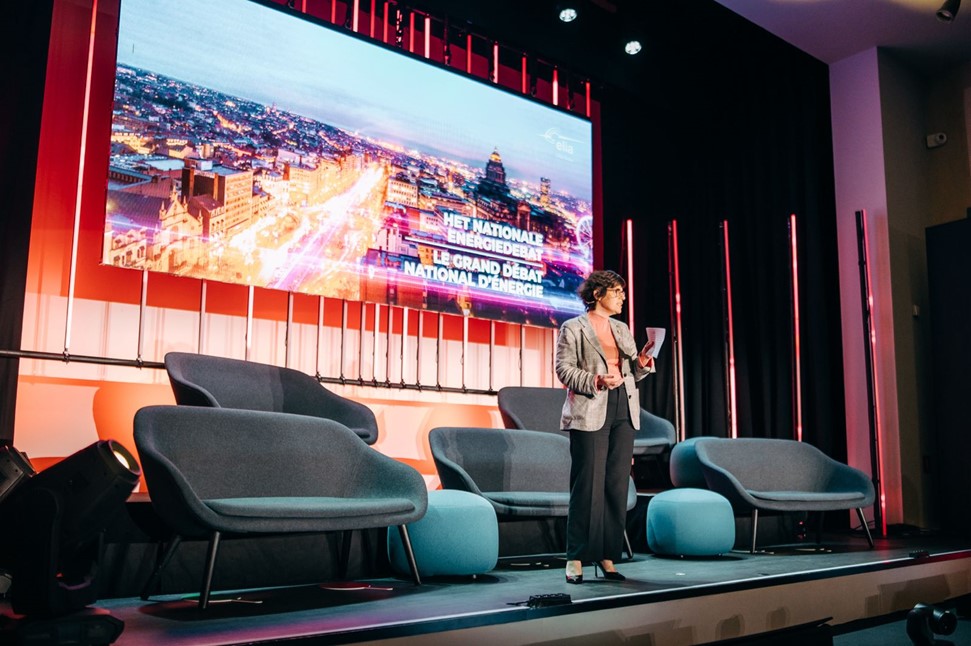Toon has a Master’s Degree in Civil Engineering (major in Energy) from the KU Leuven. He completed a 6 month internship as Derivates Analist. He work as a Junior Climate Consultant for Econopolis Climate and works on advisory projects related to climate & energy. Toon is also founder of Stroomloop, a unique trailrunning experience.
No transition without transmission: our five key takeaways from Elia’s national energy debate

On Tuesday evening, the consulting team from Econopolis made their presence felt at Elia's national energy debate. This notable event drew energy leaders from across Belgium. The highlight was the presentation of a memorandum by Elia, prepared for the impending Belgian and European elections. The core of the evening was a pivotal debate among political parties, centering on their vision for Belgium's energy grid post-election and their interpretations of the presented memorandum.
The evening provided us with five essential insights that stood out:
- "Nobody can stop the energy transition", a profound statement underscored by the federal energy minister of Belgium. This sentiment aligns closely with the trend observed in 2023, where costs for solar photovoltaic (PV) and both onshore and offshore wind energy have continued to decrease. These clean energy sources have become highly investable assets, driven by their low operational costs. This development sends a clear message: market forces, regardless of personal beliefs, are now the main drivers of investment in clean energy technologies.
- Belgium is short on renewable energy, but long on transmission capacity. Despite challenges in generating renewable energy due to limited marine and inland space, Belgium's central geographical location in Europe offers a unique advantage. The creation of Princess Elisabeth Island, the world's first artificial energy island and a flagship project to which Econopolis has significantly contributed, exemplifies Belgium's potential to serve as a critical energy hub within Europe. By leveraging its ample interconnection capacity, Belgium can overcome its spatial limitations.
- Build, build, build: The recent discussion triggered by Van Hool's challenges, focusing on the wage handicap and its impact on the competitiveness of local industries, underscores the critical need to expand transmission capacity. Without a long-term vision, Belgian manufacturing firms may face further challenges, including higher energy costs or shortages. Therefore, developing a robust and forward-looking plan for the Belgian grid is crucial to sustaining the country's industrial presence and competitiveness, and to avoid burdening Belgian firms with additional disadvantages related to energy expenses.
- Industrial Commitment and Social Acceptance: The energy transition has garnered support from industrial stakeholders, as evidenced by their ambitions to electrify processes and invest in carbon-neutral initiatives. However, achieving widespread social acceptance requires ongoing efforts to raise awareness among local and federal entities. It is crucial to educate consumers about the benefits of digital metering systems, the potential for reducing bills through flexible consumption, and the importance of investing in infrastructure to ensure the security of energy supply.
- Nuclear Phase-Out Debate and Political Posturing: The debate over phasing out nuclear energy in Belgium remains highly contentious, once again serving as a significant point of political differentiation. Despite its divisive nature, the debate underscores the importance of directing political efforts toward more pragmatic actions. Streamlining licensing procedures for new transmission projects, such as Ventilus or Boucle du Hainaut, is essential to facilitate the timely expansion of the transmission network.
In a world navigating through a transition towards sustainable energy, the insights from Elia's national energy debate underscore the complexities and opportunities that lie ahead. Organizations aiming to adapt and prosper in this evolving landscape can find expert guidance and consultation from our Econopolis consultants. Econopolis Strategy has previously undertaken economic feasibility studies, including on artificial energy islands off the Belgian coast. To explore how our consulting team can support your company on this journey, we invite you to reach out or connect with our consultants on LinkedIn.
Picture copyright: Stijn Vanderdeelen, styn.be
